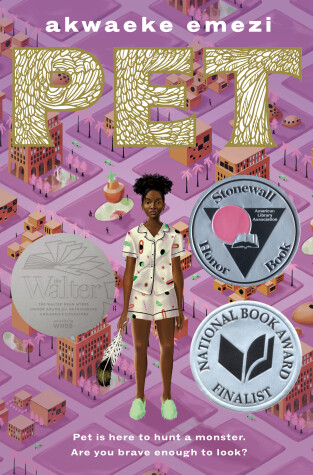Reviewed by nannah on
Content warnings:
- ableism
- child abuse
- pedophilia
Representation:
- the protagonist, Jam, is a selectively mute black trans girl
- her best friend’s parents are polyamorous
There are no more monsters in the city of Lucille. Prisons have been abolished, the police have been abolished, firearms have been banned, statues of colonizers have been replaced by monuments with names of the dead, etc. (you get the idea of the kind of alternate future this presents). Jam and her best friend, Redemption, have grown up in this utopia feeling safe and loved by their parents and peers - until a creature in one of Jam’s mother’s paintings comes to life and says it’s hunting a monster.
Right off the bat, I knew the writing style and I wouldn’t mix. A lot of the beginning (which was backstory) came across as preachy - even if I agreed with what was being said! - and slightly condescending. Characters' emotions change within seconds (Jam’s scared of the painting → a couple sentences later she wonders how she could ever be scared of it; Redemption is literally sobbing → one line of dialogue later, he’s like, “Whoa, cool!”). Emotions are told to the reader and only rarely shown: “The thing sighed and its voice dripped with even more condescension than it had before, which was kind of impressive. [...] And just like that, she was back to being annoyed.”
There are also an incredible amount of redundancies, and epiphanies happen in the most convenient times - sometimes off page. Places where the most impactful scenes could happen, like the one between Jam and Redemption, also happen off page. Their big fight (one that’s foreshadowed from the beginning) is a voicemail message. It feels like a copout, like the author didn’t know how to handle that confrontation.
The book is also very much spoiled when it ruins the “mystery” of who the monster is when right after the creature talks about hunting the monster, a new character is introduced. One described as being almost too good to be true. When Jam talks about how safe everyone is, she lingers on this person for about three-fourths of a page, compared to the 3 sentences everyone else got.
These are honestly a matter of opinion. There are some examples of really lovely writing as well (“The drive to the movie theater was quiet, with only the wind breaking against the edge of the windows. / When they pulled up, Redemption was standing on the sidewalk, waiting, tall and whipcord lean. [...] His hugs were her favorite, solid and strong and never halfway.”). The characters are vibrant too, especially Redemption and Ube, the librarian! And the very last scene is incredibly lovely and almost poetic. There are many things I love - I just feel like the book needs a few more drafts to lock everything in.
But I do need to talk about the ableism. In this utopia where all -isms and hate/prejudice against minority groups have been dismantled, ableism still exists. “Crazy” is everywhere in the text, it’s hinted that people would still react badly to someone talking to themselves (and this is written out as a joke), and Jam has thoughts like, “It was possible he thought she was out of her mind.” Normally I wouldn't be this nitpicky, but it feels like a slap in a book where every other group’s prejudices don't exist.
It's especially true for the ending, where we have the “disability as punishment” trope. I can see how it fits in the story thematically, but it's a really hurtful and harmful line of thought that still exists today. In the end, the monster becomes blinded by the monster-hunting creature, which is revealed to be an angel. Unfortunately, people still seem to think we disabled people must have gotten our conditions/diseases/etc. because we’ve done something wrong - or because we’ve done something wrong in our past lives, depending what religion you are or where you live. This book really could’ve done something else at the ending here - especially given how the victim didn’t have a voice at all (and wasn’t even present during the climax - strange considering it was their monster). At the end they were basically a doll to be fussed over, not even given a line so we understood what they thought about everything that happened.
Ultimately I do think this book has some brilliant aspects and is a very interesting idea. It’s maybe just not polished enough.
Reading updates
- Started reading
- 13 April, 2021: Finished reading
- 13 April, 2021: Reviewed
